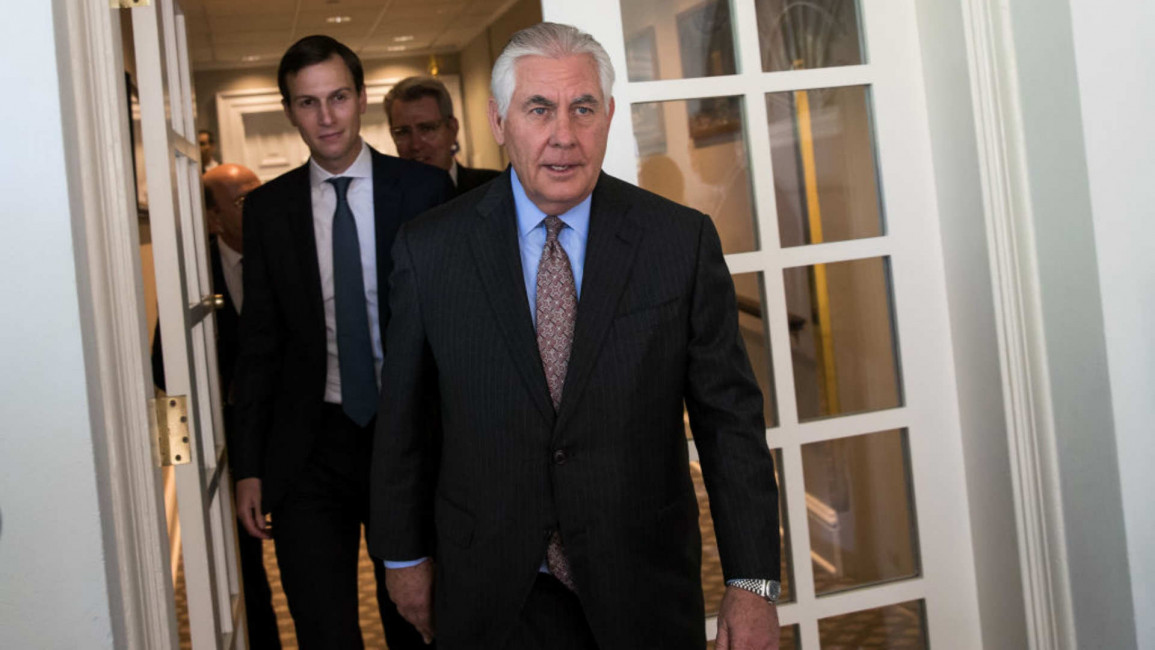
On the perils of an empty State Department
President Trump's budget slashing includes a 29 percent cut to the State Department, equivalent to approximately $10.9 billion. In addition to the myriad vacancies in personnel and programme capabilities, these cuts also include eliminating funding for United Nations programmes such as those involving peacekeeping and climate change mitigation.
The cuts are designed to reflect Trump's campaign promise of "America First", targeting programmes which are deemed poorly managed or ineffectively advancing America's foreign policy goals.
One of the apparent consequences of gutting the State Department is that it can now be bypassed altogether. Amid rumours that Rex Tillerson may be replaced as the secretary of state, his influence on a global scale seems to be dwindling quickly. Reports suggest he is being left in the dark on talks between Jared Kushner and Saudi Crown Prince Mohammed bin Salman.
Tillerson also seems to disagree with Kushner's brand of diplomacy, betting that such discussions will ultimately backfire and create more chaos in the region.
Much of the discussion from which Tillerson is sidelined revolves around the two-state solution. An official stated that, "the problem is, the senior presidential adviser [Jared Kushner] does not consult with the State Department."
 |
The usual avenues of diplomacy in the US capital have broken down |  |
The dispute between Tillerson and Kushner over how to proceed in the region is a direct consequence of the weakening of the State Department.
Another repercussion has been the oversimplification of extremely complex issues into soundbites and one-liners with which foreign dignitaries attempt to gain the support of the president and his inner circle of confidants.
Due to the budget cuts and Rex Tillerson's leadership, the usual avenues of diplomacy in the US capital have broken down. These avenues formerly consisted of undersecretaries and assistant secretaries of state, many of which remain vacant positions.
Twitter Post
|
For nations to more effectively make their case, they have begun conforming their agendas to mimic Trump's language and priorities. Countries will often reframe various initiatives as simply "combating terrorism".
In a further illustration of the chaos that has taken over the State Department, many have publicly renounced Tillerson and his leadership.
In a letter signed by Democrat members of the House Foreign Relations Committee, members cite their concerns around Tillerson's handling of the department, stating that "we are deeply concerned by the exodus of more than 100 senior Foreign Service Officers from the State Department since January… With the range of crises, war, and humanitarian disaster around the world, slashing our diplomatic corps is downright dangerous."
The signatories continue by saying that they "remain profoundly concerned over what appears to be the intentional hollowing-out of our senior diplomatic ranks and the entire State Department, with no clear goal".
As previously mentioned, the Middle East has been significantly affected by these changes. Many of today's most influential and consequential nations remain without an American ambassador.
Read more: Jared of Arabia at the heart of the Saudi sheikh-down
These countries include Egypt, Jordan, Saudi Arabia, Syria, Qatar, Turkey and Yemen. Asked about such vacancies, President Trump remarked, "I'm the only one that matters" in setting US foreign policy. As short-sighted as this position is, it has so far remained true.
There are currently only a handful of individuals who nations communicate with, thereby bypassing what is perceived to be a dysfunctional State Department. In addition to the President himself and Kushner, Vice President Mike Pence, Secretary of Defense Jim Mattis, National Security Adviser HR McMaster and White House Chief of Staff John Kelly have been pinpointed as the main individuals meeting with diplomats and foreign leaders.
 |
'With the range of crises, war, and humanitarian disaster around the world, slashing our diplomatic corps is downright dangerous' - letter signed by Democrat members of the House |  |
Perhaps as a direct result of the various vacancies at the State Department, Jim Mattis has undertaken a five-day trip "to re-affirm the enduring US commitment to partnership in the Middle East, West Africa and South Asia."
With Egypt having recently expanded military ties with Russia and approving a draft agreement for Russian warplanes to use Egyptian bases, the onus has fallen on this handful of individuals to regain American footing throughout the world, in lieu of a fully functioning State Department.
HR McMaster has also taken on a more visible role, recently highlighting a new approach to confronting global security challenges. According to this strategy, America's main goals now comprise four pillars: Protecting America and its people, advancing American trade and industrial base, preserving peace by countering China, Russia, North Korea and Iran, and combating terrorism in the Middle East.
In what amounts to one of the most understaffed and dysfunctional State Departments in modern history, diplomacy in Washington is more or less down to five or six individuals; a perilous state of affairs.
Sam Fouad is a political consultant and a global affairs analyst based in Washington, DC.
Follow him on Twitter: @_saf155
Opinions expressed in this article remain those of the author, and do not necessarily represent those of The New Arab, its editorial board or staff.




